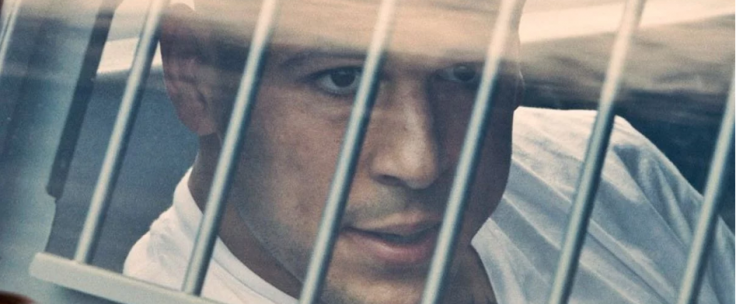Netflix released its three-part series, "Killer Inside: The Mind of Aaron Hernandez" based on the life and death of former NFL star, Aaron Hernandez, who was accused of killing several men. The docuseries, released on January 15, examines how Hernandez went on to become a convicted killer from being a highly popular NFL star.
The series that has a set of interviews with Hernandez's friends, players and insiders, will go beyond the speculations and reveal how his chronic traumatic encephalopathy (CTE), sexuality and life as a footballer led to his death. The three-hour-long series covers each aspect of Hernandez's life right from his growing up years in Bristol to his rise as NFL star till the court cases and his death by suicide inside a jail cell.
What was the case?

A valuable player with the New England Patriots, Hernandez was arrested in 2013 for the murder of Odin Llyod, the boyfriend of Hernandez's fiancée's sister. Hernandez killed Lloyd in a fit of rage after he found that the victim was talking with some people, who were not liked by the deceased player, at a Boston bar.
In the incident that took place on June 17, 2013, Hernandez along with his two accomplices, Ernest Wallace and Carlos Ortiz, took the victim to an industrial park located near the footballer's home in North Attleborough, Massachusetts. They shot Llyod and dumped his body there.
Hernandez, who had signed a $40 million contract with the New England Patriots, was found guilty of first-degree murder and sentenced life imprisonment without the possibility of parole.
Aaron Hernandez's death
While being on the trial for the murder of Llyod, Hernandez was also charged for the double murder of Daniel de Abreu and Safiro Furtado which happened in 2012. However, he was acquitted after a trial on April 14, 2017.
Five days later, on April 19, 2017, 27-year-old Hernandez was found dead in his jail cell at Souza-Baranowski Correctional Center in Shirley, Massachusetts. He hanged himself by a bedsheet.
Hernandez's lifelong battle with his sexuality
Though it was never confirmed, but there were a lot of speculations that Hernandez was gay. The docuseries argues about this aspect and maintains that he battled with his sexuality for a larger period of his life.
The Netflix series spoke to Dennis SanSoucie, a lifelong friend of Hernandez with whom he had a sexual relationship from seventh grade onwards. "Girls didn't hang out with the boys after school, so me and Aaron experimented. If I look at it now, yes, we were in a relationship back then," he spoke about the relationship which continued till the junior year of high school.
Talking about their relationship further, which SanSoucie describes as a small piece of the NFL star's sexual engagements with other young men, he said, "We didn't consider themselves homos, like the students who were openly gay, and they kept our relationship behind closed doors because of how unquestioned anti-gay prejudice was at the time. Yes, we were in a relationship back then, but at the time you don't look at it like that. After doing it, it was like, 'Did someone catch us? Did someone know?' If we get caught, our parents are gonna disown us."
Describing Hernandez's father as a physically abusive man, SanSoucie said that his late father was the type of dad who would slap the life out of you. "Hernandez was terrified that his father would find out that he was gay. He was constantly worried that someone would catch them and that they were in denial about their sexuality because they were athletes," he added.
Hernandez suffered from Chronic Traumatic Encephalopathy
On September 21, 2017, months after his death, it was found that Hernandez was suffering from Chronic Traumatic Encephalopathy (CTE), a degenerative brain disease caused by repeated head trauma. The player had a history of concussion-related injuries during his football career. The degenerative brain disease can lead to memory loss, depression and dementia.
The series spoke with some researchers who said that disease can result in poor judgment, lack of inhibition of impulses, rage, paranoia and emotional volatility which might have led to Hernandez's behaviour and ultimate suicide. The series correlated Hernandez's death with the death of former NFL player and CTE patient, Junior Seau who also committed suicide in 2012.
Living the life as a football legend
The series goes on to explore the role of football in Hernandez's life and how the stardom acquired through the sport made him believe that he was impregnable. The former New England Patriots player, while studying at the University of Florida, had punched a bar manager damaging his eardrum after he was asked to clear his bar bill tab. However, the manager did not press charges.
Hernandez also battled with drug abuse which made his selection in NFL teams a little difficult. It was only after he gave in writing for undergoing frequent drug tests that he was taken by the Patriots. In the series, Dan Wetzel, a Yahoo Sports columnist, said, "NFL was partly complicit as they drafted Hernandez despite the fact that his score for maturity in its behavioural analyses was the lowest possible and that he routinely failed drug tests. Aaron was absolutely operating on the edge."


